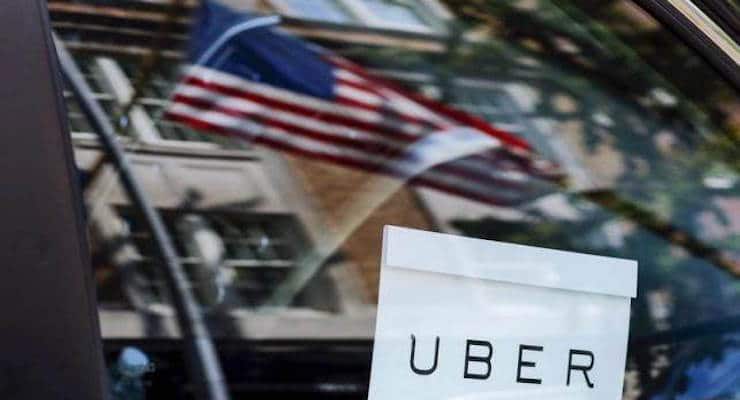

An Uber sign is seen in a car in New York June 30, 2015. (PHOTO: REUTERS)
Massachusetts has a new tax aimed at punishing Uber and Lyft drivers who dare to compete with the government regulated taxi companies.
Of course, the tax advocates don’t describe it that way. Rather, they say the 20-cent fee – and note, it’s always a fee in bureau-speak, never tax – is a win-win for all that will take a cut of all Uber and Lyft rides to distribute among the taxi companies, the cities and towns and to the state. The estimated pot of this fee-not-tax could reach millions of dollars annually, and provide big bucks to the state’s transportation fund. On top of that, the revenues will also be used to help taxi services identify and put in place “new technologies and advanced service, safety and operational capabilities” that could also lead to more workforce development, according to the text of the bill signed into law by Gov. Charlie Baker, a Republican no less.
Wow. It’s like a wonder drug — a cure-all for the state’s transportation and job opportunity woes that seem to include failing taxi technology, whatever that means. But peer past the politicking and take a whiff of the stink. The tax, which take a nickel per Uber ride for the taxi companies, a dime per ride for the local governments, and another nickel for the state to deposit in its transportation coffers, is rooted in socialist ideology.
As Reuters reported, Larry Meister of the Boston-area Independent Taxi Operator’s Association cheered its passage by saying it’s about time – Uber and Lyft drivers have been dodging the regulations that taxi companies have had to abide for years. One such regulation? Vehicular inspections by police.
“They’ve been breaking the laws that are on the books that we’ve been following for many years,” Meister reportedly said.
So the answer is more laws – more fees, taxes and government controls and interventions? That’s a miserable mentality that has no place in a free-market America.
As Kirill Evdakov, the chief executive of Fasten ride service, said while opposing the tax in the same Reuters story: “I don’t think we should be in the business of subsidizing potential competitors.”
That’s exactly right.
Only a socialist – someone who thinks the government should oversee and control business and the economy – could applaud a tax that takes money from a private enterprise and siphons it into the hands of another private enterprise. It’s particularly galling, though, when the money being taken from the private business is being used to bolster the bottom line of a competing business – and then sold as a “safety” benefit for all.
This is theft, pure and simple. And the perpetrator is the government.
Calling it a fee, dressing it as a workforce development benefit, touting it as a safety measure and talking it up as a fairness issue that levels the free market field so all can compete is nothing but spin. You want an equitable playing field for both taxi and Uber drivers – one that provides a fair shot at profit for all? Think less government, not more. Think capitalism, not socialism.
Taxi drivers ought to be fighting for less regulation of their companies, not more rules and burdens for their competitors. That, after all, is the free-market way.
[mybooktable book=”the-devil-in-dc” display=”summary” buybutton_shadowbox=”false”]
The most damning journalistic sin committed by the media during the era of Russia collusion…
The first ecological study finds mask mandates were not effective at slowing the spread of…
On "What Are the Odds?" Monday, Robert Barnes and Rich Baris note how big tech…
On "What Are the Odds?" Monday, Robert Barnes and Rich Baris discuss why America First…
Personal income fell $1,516.6 billion (7.1%) in February, roughly the consensus forecast, while consumer spending…
Research finds those previously infected by or vaccinated against SARS-CoV-2 are not at risk of…
This website uses cookies.